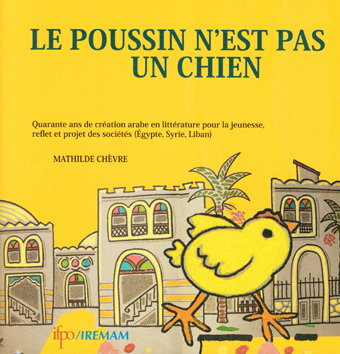Here is an academic study which we can read like a novel! The thesis by Mathilde Chèvre in 2013 in Aix Marseille University was destined to turn into book. Far from the distant jargon, this work successfully combines the reliability and accuracy of the analysis to the beauty of the language and the illustration. Hence this beautiful book published in 2015 in French and Arabic version at the presses IFPO / IREMAM.
After 10 years of working in editing, the writer, publisher and illustrator, takes in this book her pen of researcher to show us the editorial creation for the youth of three Arab countries: Egypt, Syria and Lebanon since 1967.
Youth literature and picture in the Arab World
The initial intuition was that the Arab creation for youth reflected a social project. In fact, the 1967 Naksa (defeat) is chosen as the symbolic date of the awakening of consciousness to future generations. What story will we tell to our children? On which legacy will we lean? Is there an Arabic visual identity? Which language to choose or invent to a public who passes between the spoken dialect and classical Arabic writing? But first, what corpus to rely on? Given the bibliography poverty regarding the history of Arabic literature, the investigation is formed from the human memory and transports readers into this adventure made of meetings and readings.
The introduction is especially interesting because it shows the steps of the methodological elaboration. It reflected doubts, ethical and intellectual issues. This method becomes a path, it stumbles and readjusts, it proposes to better accommodate. It exposes its subjectivity to better reflect that of its interlocutors. Thus the researcher chooses to offer books of her publishing house The port has yellowed (Le port a jauni) during the conversation and the formal meeting becomes more personal, more passionate. Likewise, she realizes that «the act of making the researches public helps to feed them ».
New dynamics in the youth edition
The answers intersect crossing different subjects: sociology, semiotics, small and great history (ies), the book economy. Between the strong ideology of the 1970s and the emergence of more existential issues in the 2000s, emerged ruptures and continuities. Telling stories to children is not an innocent game !
Mathilde’s analysis work highlights the thematic and chromatic hotlines that tell the world from a collective point of view. Thus the enemy is shown in profile and deformed. Similarly, the work of illustrator El Abad is an inexhaustible source of inspiration for many illustrators. He testifies in his designer book : «Me I do not come from nowhere, I come from postcards of my childhood dream of being the tram driver, I come from books with engravings of my childhood, from illustrations of Maqamats, from Kalila wa Dimna, I come from an education very influenced by Western painting, and I reinvented the flesh colour of a world where we read from right to left, where my heroes and Antara and not Superman I come from painted houses of the Nile Valley, which they even come from Pharaonic tombs, I come from Tatriz and embroidery, I come from tattoos and henna, I come from Aragoz (Turkish puppets) ».
The stories also reflect a change of the outlook on the child. A movement reflects the passage of the “we” to “I”. In the 2000s, the hero child becomes a carrier of an own intention, sometimes different from adults, even an inner life rich in a whole range of feelings. In Egypt, the disheveled heroin Farhana contrast to the wise Martine, Tulin in Arabic, whose translations are still encountering great success in many Arab countries. Social or political struggle is represented more metaphorically. Metaphors that can also evoke the inner struggles…
By asking more questions than it provides answers, the book is for a reader actor, free in his interpretation and free to pursue his research.
For more information :
To purchase the book : “Le poussin n’est pas un chien” has been distributed in France by L’atelier du poisson soluble (contact Claire BRETIN: claire@poissonsoluble.com) and by Les presses de l’IFPO with l’ISBN : 978 2351 597 088.




